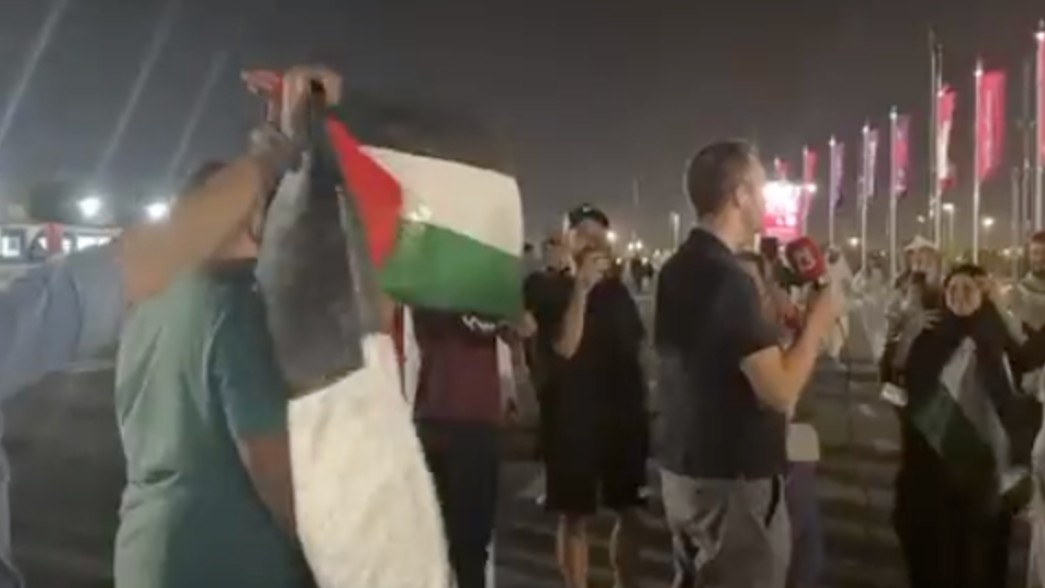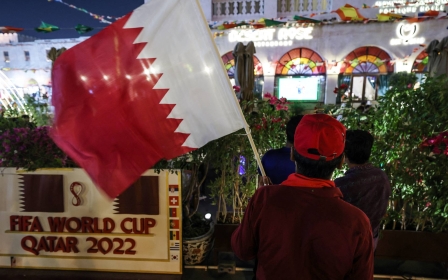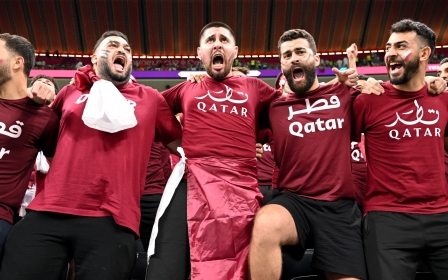Qatar World Cup: Israeli journalists get silent treatment from Arab fans

Arab football fans at the Qatar World Cup are shunning Israeli journalists trying to interview them in solidarity with Palestinians.
Israeli officials had voiced hope that US-brokered normalisation deals with the United Arab Emirates and Bahrain in 2020, and later Sudan and Morocco, would spur further normalisation, including with Arab heavyweight Saudi Arabia.
But Qatari residents and fans from further afield have refused to talk to Israeli reporters after finding out who they work for.
Footage circulating online showed two Saudi fans, a Qatari shopper and three Lebanese fans walking away from Israeli reporters. Others have waved the Palestinian flag behind the Israeli journalists as a show of boycott.
New MEE newsletter: Jerusalem Dispatch
Sign up to get the latest insights and analysis on Israel-Palestine, alongside Turkey Unpacked and other MEE newsletters
A reporter with Israel's Channel 12 was also given a rude awakening by Lebanese fans, whom he addressed in Arabic after the World Cup opening ceremony on Sunday.
"Are you Lebanese? I'm Israeli!" said the presenter in Arabic.
The fans immediately turned their back on him, with one coming back to say, "It's called Palestine - there is no Israel."
Another Channel 13 reporter could be seen surrounded by Palestinian fans waving their flags and chanting "go home" when he was doing a live TV interview.
Rana Idris, a Sudanese national working in Doha, said there was "no way" she would accept an interview with Israeli media. "Israel doesn't exist," she told Middle East Eye.
Qatar does not officially recognise Israel, setting Palestinian statehood as a condition for that. But it has allowed direct flights from Tel Aviv for the World Cup, as well as a delegation of Israeli diplomats to handle logistics.
Like Doha, Riyadh rules out normalisation for now but since 2020 it has allowed Israeli airlines to overfly Saudi territory.
The US State Department has lauded the Tel Aviv-Doha flights as holding "great promise to bolster people-to-people ties and economic relations".
Mubarak, a Qatari citizen who requested that we not use his full name, told MEE that the presence of Israeli media was "not acceptable" for most Qataris, but they had begrudgingly accepted as the country hosts the tournament.
"The only way Qataris can show their disapproval is by ignoring them [Israeli media].
"Qatari people are against normalisation with Israel, as many Gulf countries did. We’re still conservative about this stuff, ignoring is the only way now to move on with this situation. The World Cup will end and they will go back."
The normalisation agreements, known as the "Abraham Accords", were signed in the final months of the Trump administration and shattered a longstanding Arab consensus that there should be no normalisation with Israel until it reaches a comprehensive peace deal with the Palestinians.
Palestinian leaders strongly expressed their disappointment with the deals, which are largely seen as a betrayal of their goals for statehood.
The agreements were also rejected by residents and nations from the four Arab countries, with more than one million people signing an online charter rejecting the accord.
AP Muhammed Afsal in Doha and Mohammad Saleh in London contributed to this story.
Middle East Eye delivers independent and unrivalled coverage and analysis of the Middle East, North Africa and beyond. To learn more about republishing this content and the associated fees, please fill out this form. More about MEE can be found here.




